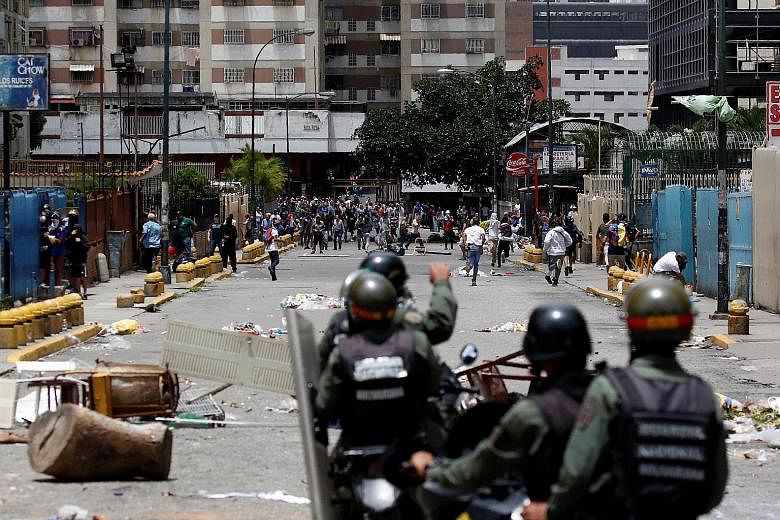CARACAS • A nationwide strike brought parts of Venezuela to a halt as the opposition ramped up its challenge to President Nicolas Maduro that has already seen four months of deadly street protests and threats of US economic sanctions.
The 24-hour shutdown on Thursday affected areas of the capital Caracas and other regions, including the country's second-biggest city of Maracaibo, with businesses shuttered, public transport stalled and streets deserted.
The opposition has claimed that 85 per cent of the country participated in the shutdown, during which anti-government demonstrators clashed with riot police in parts of Caracas and set a police booth on fire. Stones were also thrown at the headquarters of VTV state television. Several people were later arrested. Two young men were killed in separate demonstrations, according to the authorities, bringing the death toll since April to 99.
"It doesn't matter losing a day's work if we're losing the country," said a 34-year-old owner of a small construction firm who gave only his first name, Omar. "I'm joining the strike to rescue the little remaining for us, to increase pressure" on Maduro, he added.
By backing the opposition's "final offensive" against the President, company owners taking part risked government reprisals.
In pro-government parts of the capital, however, life went on as normal. Some workers in public offices were reluctant to take part, afraid it would cost them their jobs. "If I don't go to work, they'll fire me," said public worker Carolina, 39.
Mr Maduro seized on the areas of normality to claim victory over the strikers, saying key sectors were "100 per cent" unaffected by the strike.
The opposition effort unfolded as Mr Maduro's unpopular socialist government faced escalating international pressure to back off from the special election on July 30.
The vote would elect a body - a Constituent Assembly - to rewrite the 1999 Constitution and further squelch the opposition-controlled National Assembly in a move widely viewed by critics as a power grab.
The Trump administration, pressed by prominent US lawmakers, is weighing sanctions up to and including bans on Venezuela's all- important oil exports if the vote is not called off. But the head of state- run oil firm PDVSA on Thursday told state television that the strike had not affected its operations.
The opposition has pledged to form a transitional government after an unofficial referendum on Sunday in which 7.6 million Venezuelans rejected the government's bid for a new Constitution and demanded new national elections.
Surveys by polling firm Datanalisis have shown over 70 per cent of Venezuelans reject Mr Maduro's leadership, but he has brushed aside opposition moves to force him out, banking on support from a loyal military. With past efforts at dialogue having failed, the opposition has turned to sustained street protests, as well as calling Thursday's strike.
Some in Mr Maduro's camp have broken ranks, most prominently his Attorney-General Luisa Ortega, who has branded the Constituent Assembly unconstitutional.
On Thursday, a senior Venezuelan diplomat at the United Nations, Mr Isaias Medina, resigned. "I cannot be part of a government that is systematically attacking protesters" and not respecting their right to demonstrate, he said.
Mr Maduro has presented his Constituent Assembly as the only path to "peace" and prosperity, but has not explained how the body or a new Constitution would bring that about.
AGENCE FRANCE-PRESSE, WASHINGTON POST, REUTERS

